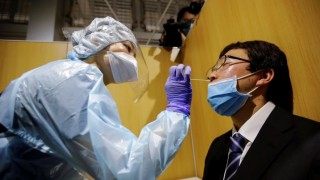Loading
Search
▼ Vaccine ‘Passports’ Spark Discrimination Fears In Japan
- Category:Other
TOKYO -- Japan aims to use its planned certificates for coronavirus vaccine recipients primarily for international travel, concerned that requiring them in domestic settings like events and restaurants could lead to discrimination against those who have not received the shot.
The government envisions launching digital certificates when it starts vaccinating the elderly as early as April.
One proposal is to use coupons distributed by local governments to those eligible for the shot. A QR code on the coupon will be scanned at the vaccination site, and a digital certificate will be sent to the recipient's smartphone. The certificates will also be tied to a nationally managed database for vaccination records.
"There is a global effort to systematize vaccination records for international travel," Taro Kono, minister in charge of administrative reform, told lawmakers on Friday. "If we don't adapt, the Japanese people will struggle."
But there are concerns that the new system could infringe on personal rights. "We could see a problem with discrimination and prejudice, so we need to approach this carefully," Health Minister Norihisa Tamura said at a Jan. 27 budget meeting when asked whether those without a certificate could be refused entry to restaurants and event venues.
An update to Japan's coronavirus legislation, which takes effect Saturday, stipulates that the national and municipal governments must ensure nobody faces discrimination over the pandemic. Tamura suggested that banning individuals who have not received the vaccine from entering certain spaces or working at health care facilities could violate this clause.
"It's unlikely that domestic authorities would ask to see the certificate," Kono said Friday.
"We are not at all considering" limiting non-recipients from the government's Go To Travel subsidies, designed to boost Japan's tourist-related businesses, Transport Minister Kazuyoshi Akaba also said.
Japan's medical institutions already issue vaccination certificates for yellow fever and hepatitis A. But they are meant to be presented when entering countries that require these shots, for example, and are not intended for domestic use.
Pushes for similar certificates are underway across the world, especially in areas that have started vaccinating their population against COVID-19.
The European Union is working on a digital certificate that would allow vaccine recipients to travel freely between its member nations. Greece urged the European Commission to swiftly set universal rules regarding these certificates, such as how they can be used.
Denmark is preparing to issue certificates to those traveling to a country that requires vaccines for entry. Estonia, a global leader in digital transformation, signed an agreement with the World Health Organization to jointly develop an international digital vaccine certificate.
The U.S. currently issues a paper certificate, which lists information like vaccination dates. Microsoft, Oracle and other companies are working on a digital version on a smartphone app that can be used internationally.
used for travel, or also when commuting, attending events or shopping. Japan will need to set clear boundaries on the uses.
"We are considering granting access to vaccination records and filings online," said Fumiaki Kobayashi, a ruling Liberal Democratic Party lawmaker and a close aide to Kono.
The certificates could also impact the Tokyo Olympic and Paralympic games this summer, which could potentially be held without spectators.
"If the certificates are adopted quickly, we would have more options like allowing some audience members," an LDP official said.
Not all agree. "This would require a political decision to prioritize vaccinations for athletes and audience members," said Hitotsubashi University professor Tagui Ichikawa. "It's unclear whether the necessary preparations, like creating a record system, can be done in a few months."
Uncertainties also remain on the effectiveness of the vaccines.
While recipients would face a lower risk of infection and severe symptoms, they could potentially still transmit the virus to others. The U.K. is planning to hold off on issuing a vaccine passport until it can verify the vaccines' efficacy.
- February 11, 2021
- Comment (0)
- Trackback(0)


